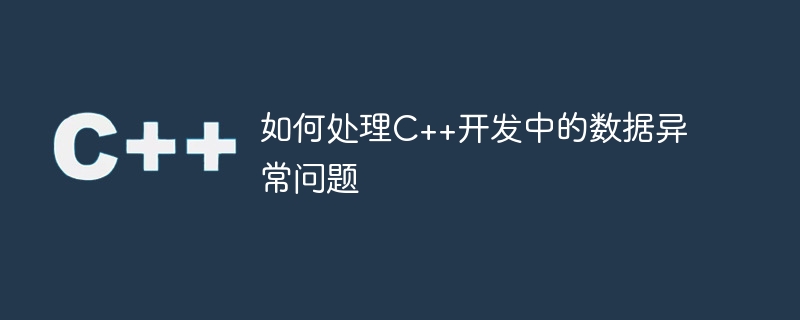Home >Backend Development >C++ >How to deal with data exceptions in C++ development
How to deal with data exceptions in C++ development
- WBOYWBOYWBOYWBOYWBOYWBOYWBOYWBOYWBOYWBOYWBOYWBOYWBOriginal
- 2023-08-22 16:58:472026browse

How to deal with data exceptions in C development
In the C development process, handling data exceptions is a common and important issue. When the program is running, various data exceptions are often encountered, such as out-of-bounds access, null pointer reference, data overflow, etc. These exceptions can not only cause program crashes, but can also lead to data corruption or even system crashes. Therefore, handling data exceptions reasonably is crucial to ensuring the stability and security of the program.
Below, we will introduce some common data anomaly problems and provide some processing methods.
1. Out-of-bounds access
Out-of-bounds access means that the program attempts to access elements that do not exist in the array or container. Such access can cause the program to crash or return incorrect results. In order to avoid out-of-bounds access, we can take the following measures:
- When using arrays or containers, always check the validity of the index value. You can use conditional statements or try-catch blocks to catch exceptions that may be thrown.
- Use an iterator for access instead of using the index value directly. Iterators can help us better control the access scope and avoid out-of-bounds access problems.
- Use safe container classes provided by the standard library, such as std::vector and std::list. These container classes provide a checking mechanism for out-of-bounds access, which can effectively avoid out-of-bounds access problems.
2. Null pointer reference
Null pointer reference means that the program attempts to access the memory address pointed to by a null pointer. This memory address has not been allocated to the pointer. Such references can cause the program to crash or return incorrect results. In order to avoid null pointer references, we can take the following measures:
- Always check the legality of a pointer before using it. You can use conditional statements or try-catch blocks to catch exceptions that may be thrown.
- Initialize the pointer to nullptr before using it. This avoids the problem of uninitialized pointers.
- Use smart pointers to manage resources, such as std::shared_ptr and std::unique_ptr. Smart pointers can automatically manage the life cycle of resources and avoid the problem of null pointer references.
3. Data overflow
Data overflow means that the program attempts to assign a value that exceeds the representation range of the data type to a variable of that type. Such assignments can cause data corruption or return incorrect results. In order to avoid data overflow, we can take the following measures:
- Before performing data operations, determine whether the operation results will exceed the representation range of the data type. You can use conditional statements to check.
- When using data types, choose the appropriate type to store the data. For example, use the int type to store a smaller integer instead of the long type.
- Use safe numeric types provided by the standard library, such as std::numeric_limits and std::overflow_error. These types provide mechanisms for checking and handling overflow conditions.
4. Memory Leak
Memory leak means that after the program allocates memory, it does not release the memory in time, resulting in a waste or exhaustion of memory resources. In order to avoid memory leaks, we can take the following measures:
- After using dynamic memory allocation operators (new, new[]), always use the corresponding release operators (delete, delete[]) to release memory.
- Use smart pointers to manage resources, such as std::shared_ptr and std::unique_ptr. Smart pointers can automatically manage the life cycle of resources and avoid memory leaks.
- Use RAII (resource acquisition i.e. initialization) technology to manage resources. RAII can help us obtain resources during object construction and release resources during object destruction, thereby avoiding the problem of resource leaks.
Summary:
Dealing with data anomalies in C development is an important task that requires us to always be vigilant and take appropriate handling measures. During the code writing process, we should pay attention to checking the legality of the index values and pointers of arrays and containers, choosing appropriate data types to store data, and releasing dynamically allocated memory resources in a timely manner. At the same time, using the safe types and smart pointers provided by the standard library can help us better handle data anomalies. By handling data exceptions reasonably, we can ensure the stability and security of the program.
The above is the detailed content of How to deal with data exceptions in C++ development. For more information, please follow other related articles on the PHP Chinese website!
Related articles
See more- Basic configuration guide for Linux C/C++ development using CLion
- How to optimize dictionary search speed in C++ development
- How to deal with data storage issues in C++ development
- How to optimize image compression algorithm speed in C++ development
- How to optimize image generation speed in C++ development

